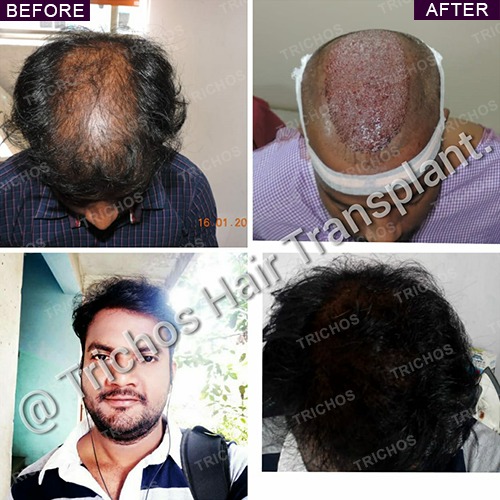Can Pustules Lead to Hair Loss & Baldness?
During summer, we often notice the formation of pustules, small blisters or pimples on the skin containing pus. They grow on the hairline and on the scalp or parts of the body where there is hair growth or inside places which are tightly covered. But, can they cause hair fall or lead to baldness?
In this educational video, Dr John Watts – a noted dermatologist, trichologist and hair transplant surgeon in Hyderabad – explains everything about pustules and why one has to take preventive steps to stop growing.
What causes Pustules’ formation?
In his introductory talk, Dr John Watts lists out the factors that may lead to the formation of pustules on the scalp or hairline.
“Due to excessive sweating or excess oil production, the skin pores can get blocked. This can lead to the accumulation of sebum when dust gets trapped and result in the formation of folliculitis and pustules. They are reddish in appearance and may be painful,” explains Dr John.
Head Gear: Wearing tight headgear like caps, helmets, bandanas or stoll can lead to excessive sweating or produce oil on the scalp. “If there is no drainage and the dead cells are not washed properly, it may trigger pustules,” explained Dr John Watts.
Hair Care Products:
Certain hair care products can produce oil. But when the scalp is not washed properly, the excess oil can lead to the formation of pustules.
Hormone Effect:
Due to the influence of hormone effect, our scalp can produce excess oil and it could lead to the formation of pimples and pustules.
Heredity Effect:
The heredity effect also plays an important role in one experiencing excess oil production on the scalp or formation of pustules or pimples.
Makeup Products:
Not cleaning makeup products properly can also trigger the growth of pustules on the eyebrows, moustache or hairline as they can clog the pores and also lead to folliculitis.
Can pustules lead to hair loss?
Dr John Watts answers this million-dollar question: “Yes, unchecked growth of pustules can lead to permanent hair loss but the hair loss would be patchy,”
Pustules: Prevention
Dr John Watts suggests the following steps to prevent the growth of pustules including how one can stop its aggravation.
Don’t Touch:
When pustules are formed, the first step is not to touch or break them with one’s fingertips as it would aggravate the condition. “The fingertips may have come in contact with bacteria already by touching different things. Hence, it is better not to touch with one’s fingertips unless it is cleaned properly,” said Dr John.
Don’t Rub:
While taking a bath or a shower, there is always a tendency to rub pimples or pustules or prick them. “This should be avoided. Touch it gently while taking a bath using no pressure,” advised Dr John.
Stop Oily Products:
Whenever one notices the growth of pustules, it is always advisable to stop using oily hair care, cream or oil products. “If one still wants to use any cream, better to switch on to non-comedogenic products and stop using hair oil for some time,” advises Dr John.
Don’t wear tight Head Gear:
This is a must rule to follow as one must avoid wearing tight headgear as pustules grow easily in such conditions.
Consult Dermatologist:
Those battling with pustules growth should consult a dermatologist immediately. “One may need antibiotic treatment. If required, your dermatologist can also advise you for a pus culture to know which bacteria are responsible for it,” informed Dr John.
Conclusion:
Can pustules lead to hair loss? “Yes, it may lead to patchy hair loss. Hence, do not neglect it,” informed Dr John, while urging his followers to share the video with their friends.
Trichos provides state-of-the-art treatment for various hair loss conditions. Please reach us for any query.
Book an appointment for expert guidance


About
Causes
Alopecia
Restoration
Procedures
Locations
Disclaimer: While hair transplants are generally safe and effective, as with any medical procedure, there can be minimal and temporary side effects based on specific or underlying medical condition of the individual patient. Please consult in person with our qualified medical team at Trichos for a thorough assessment of your specific condition and individualized guidance on the potential risks and benefits associated with our hair restoration treatments.
Learn more about Medical Consent for Surgeries.



